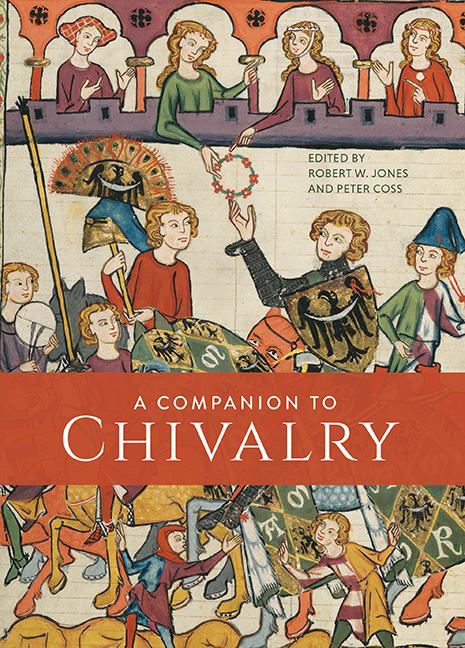Book contents
- Frontmatter
- Contents
- List of Illustrations
- List of Contributors
- Introduction
- 1 The Origins and Diffusion of Chivalry
- 2 The Organisation of Chivalric Society
- 3 The Secular Orders: Chivalry in the Service of the State
- 4 The Military Orders
- 5 Marshalling the Chivalric Elite for War
- 6 Chivalric Violence
- 7 Chivalry in the Tournament and Pas d'Armes
- 8 Heraldry and Heralds
- 9 Arms and Armour
- 10 Constructing Chivalric Landscapes: Aristocratic Spaces Between Image and Reality
- 11 Gendered Chivalry
- 12 Chivalric Literature
- 13 Manuals of Warfare and Chivalry
- 14 The End of Chivalry? Survivals and Revivals of the Tudor Age
- 15 Chivalric Medievalism
- Select Bibliography
- Acknowledgements
- Index
2 - The Organisation of Chivalric Society
Published online by Cambridge University Press: 24 October 2019
- Frontmatter
- Contents
- List of Illustrations
- List of Contributors
- Introduction
- 1 The Origins and Diffusion of Chivalry
- 2 The Organisation of Chivalric Society
- 3 The Secular Orders: Chivalry in the Service of the State
- 4 The Military Orders
- 5 Marshalling the Chivalric Elite for War
- 6 Chivalric Violence
- 7 Chivalry in the Tournament and Pas d'Armes
- 8 Heraldry and Heralds
- 9 Arms and Armour
- 10 Constructing Chivalric Landscapes: Aristocratic Spaces Between Image and Reality
- 11 Gendered Chivalry
- 12 Chivalric Literature
- 13 Manuals of Warfare and Chivalry
- 14 The End of Chivalry? Survivals and Revivals of the Tudor Age
- 15 Chivalric Medievalism
- Select Bibliography
- Acknowledgements
- Index
Summary
What was chivalric society? The answer to this question, like all such questions, will depend much on the audience to which it is being addressed and the perspectives from which it is being considered, from the social to the geographical, the chronological to the hierarchical, the military to the more narrowly political, the central to the local. Further clarification is required due to the fact that the emphasis in the title of this chapter is on the organisation of chivalric society, with the implication being that someone or something was doing the organising. This in turn begs the question of what he, they or it were actually organising chivalric society for. To prevent confusion from the outset, therefore, this chapter will be concerning itself with the monarchies of medieval Europe, specifically western and central Europe, for the reason that throughout this era they constituted the executive power most capable of organising chivalric society. This society, in turn, will be defined in its simplest and least contentious sense as the knights and those above them, bearing a panoply of noble titles, who might be considered as knights cloaked in supplementary regalia. The slight exception to this rule comes in the period from c. 1350 to 1450 when, in the later stages of vital chivalric society, many esquires were effectively accepted, by a process of osmosis and adaptation, into the evolving sense of what it meant to be chivalric. This is highlighted, for instance, by the fact that Geoffroi de Charny, the fourteenth–century author of the famous chivalric treatise Le Livre de Chevalerie, clearly saw fit to include all men–at–arms, and not only those actually dubbed to knighthood, among the chivalrous. As for what these knights and the broadly knightly were being organised for, it would be difficult and arguably unnecessary to look beyond the two primary purposes of war and government, with the various emphases on defence, security, territorial aggrandisement, regional administration and law and order which those terms imply. These basic terms of enquiry having been clarified from the outset, attention can thus be turned to the more interesting question of how the monarchies made, or attempted to make, chivalric society work for rather than against them.
- Type
- Chapter
- Information
- A Companion to Chivalry , pp. 39 - 56Publisher: Boydell & BrewerPrint publication year: 2019



